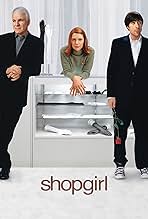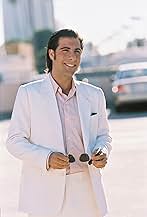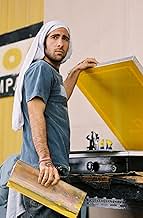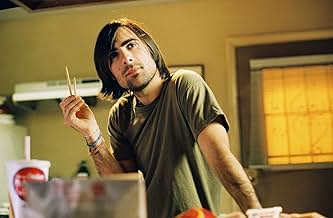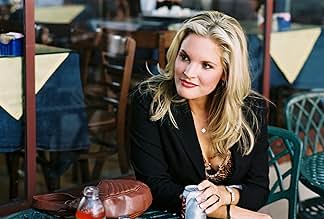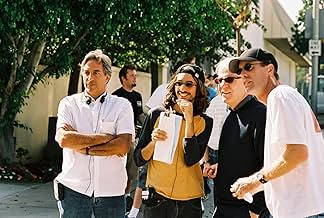Shopgirl
- 2005
- Tous publics
- 1h 46min
Ajouter une intrigue dans votre langueA film adaptation of Steve Martin's novel about a complex love triangle between a bored salesgirl, a wealthy businessman and an aimless young man.A film adaptation of Steve Martin's novel about a complex love triangle between a bored salesgirl, a wealthy businessman and an aimless young man.A film adaptation of Steve Martin's novel about a complex love triangle between a bored salesgirl, a wealthy businessman and an aimless young man.
- Réalisation
- Scénario
- Casting principal
- Récompenses
- 1 victoire et 7 nominations au total
- Hot Tears Band Member
- (as Johnny Fedevich)
Avis à la une
The main issue with the film is Anand Tucker's direction. Only his second feature film, following 1998's Hilary and Jackie, Shopgirl is played far too serious. A heavy camera seems to plod its way through scene after scene. Several moments, mostly those with Jason Schwartzman in them, try to lighten things; but even some fairly good laughs cannot remove the feeling that this isn't a very happy film.
It is perhaps unfair to blame Tucker for the mood entirely. Similar complaints were leveled against Martin's original novella. But how much more endearing, how much more fun, this film would've been under someone like Rob Reiner. It is, after all, a comedy of relationship errors. There is drama here but the heart and soul of the story is in the laughter. The mistake is entirely in playing it as a drama with comedy, not a dramatic comedy.
The other main flaw is the tedious, and essentially needless, voice-over narration. Whether in screenplay format the narration read fine, or if it was added later to clarify the film for mainstream audiences, it detract. The actors are all capable enough to express their emotions without explanation. It is not hard to tell when a young woman goes home to an empty apartment and a cat that she is lonely. As remarked by a man sitting behind me: "A movie loses something when it has to be explained." The problem with the narration here is that Shopgirl doesn't need to be explained, but is.
Not helping the dreary atmosphere is Barrington Pheloung's ridiculously over-dramatic score. Echoing the work of Alexandre Desplat, especially Girl With a Pearl Earring (produced by Tucker), Pheloung seems insistent upon forcing drama into every note. The music plays less as an underscore than as an upstaging diva. Other technical work reaches must loftier heights. Nancy Steiner's endearing costume design, a cross between her work on The Virgin Suicides and a Day/Hudson comedy, gives instant heart to the characters. Danes' Mirabelle benefits the most. Likewise the art direction, by Sue Chan and David Smith, is delightful. Danes' apartment has an apt Vermont-meets-L.A. feel whereas Martin's two homes are cold and hollow, like his character.
The curious thing is that when all the elements come together Shopgirl is an enjoyable experience. As it was playing I really liked it. But when all is said and done there is something missing. Once you stop laughing you realize it is a profoundly unhappy film. Despite the strong and endearing performances the film is simply too sad to win any hearts, but well-meaning enough not to send any away.
Sure, Ray is playing out a fantasy that is kind of creepy, but there are women looking for that kind of relationship, just listen to Dr. Laura. And men too, of course. Plus, the voice over sets this up as it basically says she is looking for love to "find her" and Ray does, so this is built into the premise like it or not. Over the course of the movie she matures beyond her fantasy, and I would like to think Ray does as well, although that isn't as clear.
Vermont transplant Mirabelle Butterfield is an undiscovered artist working as a sales clerk at Sak's Fifth Avenue in LA. Unfulfilled and lonely (even her cat won't come out to greet her upon returning from a day's work)she meets and dates two completely different men. Jeremy is a man child that finds wonderment in neon signs and sees no problem in using plastic sandwich bags for a condom. Then there's sophisticate Ray Porter who has homes in LA and Seattle and gets around by private jet. Jeremy is quickly jettisoned once Mirabelle feels she has something more serious and tangible in her relationship with the wealthier and older Ray so he gets a job as a roadie and goes on tour with a rock band. Meanwhile Ray's feelings remain ambiguous. It eventually goes bad in the most mannerly of fashion just in time for the freshly scrubbed Jeremy to reappear.
Shopgirl has a sleek trendy look to it with it's stylish sets and well heeled characters roaming the upscale store, chic museums and fine restaurants as well as Porter's sterile residences. But the film plods along at an uninteresting pace because the film never really gets deeply into the characters. Without the interior monologue of the novella director Anand Tucker seems content to allow his characters to tell their stories with wan expressions of joy and sadness. To make sure you don't miss these telling glances he spends a lot of time overusing slow motion and employing a prodding music score to bring some life to the characters.
Claire Danes does what she can with the glum Mirabelle and it's not a whole lot since Tucker seems content to just film her pretty face in a series of reactions. She and Martin have some decent scenes with each other (especially when she attempts to cut back on her anti-depressent)but the relationship for the most part is tepid. Steve Martin is a disaster as Ray lacking the actors chops to show any emotion, even the restrained variety that the non-committal Porter protects himself with. In order to balance these dull lifeless creatures Tucker and Martin turn Jeremy (Jason Schwartzman) into a lovable shaggy dog, cutely clueless and upbeat.
Shopgirl is Woody Allen territory without the comic irony and Erich Rohmer land without the introspection or depth of character. It's well mannered has a nice veneer but lacks the energy to ever really take off. Jeremy and Ray are cliché polar opposites, (old wild and crazy Steve versus the mature and refined Steve)but naturally caring and compassionate in their own way. Martin and Tucker refuse to employ negative capability to either character thus diluting the film's somber dramatic tone even more. Ray's passive interest lacks edge in either direction and the selfishness of his actions are betrayed by the makers need to almost make him as sympathetic as Mirabelle, thus stealing her thunder and reason to rage. It undermines Shopgirl which drably plays it safe from beginning to end.
It's also no real secret that many of his recent films have been far from great.
So, still having faith in the man, and having loved the novel on which this film is based, I went in to the cinema desperately wanting to like it, but expecting to be disappointed. Largely, I was pleasantly surprised that the novel did transfer well to the screen.
Some of the credit for this belongs to director Anand Tucker, who has created some powerful images of the hustle and bustle of the LA that Martin describes in the novel, and contrasts it well with the characters who lead shallow lives, trying to be something meaningful amongst all the chaos.
Credit also goes to the actors who show that longing that drives the situation: Claire Daines as Mirabelle clearly WANTS to be social, artistic, loved; Jason Schwartzman as Jeremy WANTS to be sensitive, witty, lovable; Martin as Ray Porter clearly WANTS to be suave and considerate. Without having many jokes in the script, audiences can still appreciate the humour by seeing these pathetic struggles. When I saw it there was plenty of laughter at all the right moments.
I will, however, hasten to add that there are parts of the book that never would have translated well to the Hollywood screen, and the praise that some give the movie for serving its purpose will contain the same reasons that others wish to knock it. The book's strength is that one can feel for the characters because they are portrayed as superficial people and their lives and conversations are so shallow in comparison to the narrative that sets them up. The reasons why it works so well as a book could well be the very things that cause it to not work on the screen. Then there's the matter of a book that's so rooted in "LA sux" sentiment being made into a Hollywood movie. So maybe the musical overkill reeked of "excuse me, we're trying to tell you something". Maybe the spots of narration felt out of place and indicated that Martin is not yet over his desire to spend his life as the 'star' of his projects (him getting top billing for the movie was also a bit much, in my opinion).
Ultimately, maybe the audience members who were longing for a film with more 'depth' and 'substance' were in actuality sharing the characters' longings for the same in their own lives. Maybe the 'criticisms' are in fact backhanded compliments that the film is largely doing just what it's meant to do.
Le saviez-vous
- AnecdotesFor the scene in Mirabelle's bedroom where the cat jumps on the bed and watches her and Jeremy, there were actually two cats used. The director explains in his commentary that one could jump but never watched, and the other was good at watching but couldn't jump.
- GaffesThe card that Ray sends to Mirabelle reads "I would like to have dinner with you" in block print, with a signature at the bottom. When we see this card again at the very end of the movie, the signature has been replaced by "Ray Porter" in block print.
- Citations
Ray Porter: As Ray Porter watches Mirabelle walk away he feels a loss. How is it possible, he thinks, to miss a woman whom he kept at a distance so that when she was gone he would not miss her. Only then does he realize that wanting part of her and not all of her had hurt them both and how he cannot justify his actions except that... well... it was life.
- ConnexionsFeatured in Late Show with David Letterman: Épisode #13.53 (2005)
- Bandes originalesLily & Parrots
Written and Performed by Mark Kozelek
Published by God Forbid (BMI)
Courtesy of Jetset Records
Meilleurs choix
Détails
- Date de sortie
- Pays d’origine
- Langues
- Aussi connu sous le nom de
- 灰姑娘的愛情手套
- Lieux de tournage
- 2250 Apollo Dr., Los Angeles, Californie, États-Unis(Ray Porter's home.)
- Sociétés de production
- Voir plus de crédits d'entreprise sur IMDbPro
Box-office
- Budget
- 10 200 000 $US (estimé)
- Montant brut aux États-Unis et au Canada
- 10 284 523 $US
- Week-end de sortie aux États-Unis et au Canada
- 229 685 $US
- 23 oct. 2005
- Montant brut mondial
- 11 675 161 $US
- Durée1 heure 46 minutes
- Couleur
- Mixage
- Rapport de forme
- 2.35 : 1
Contribuer à cette page








